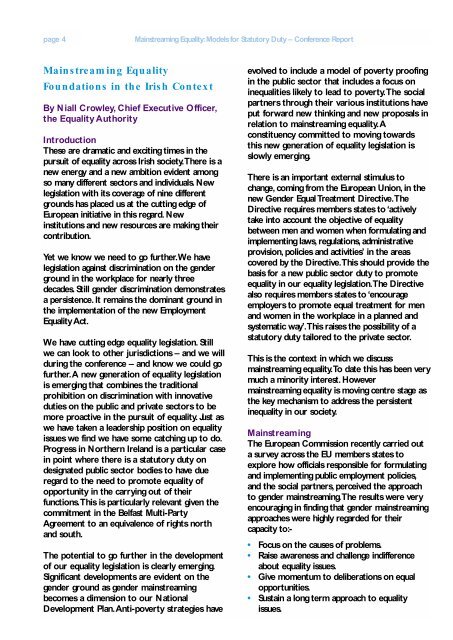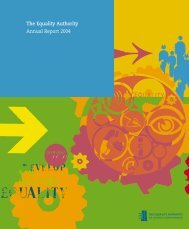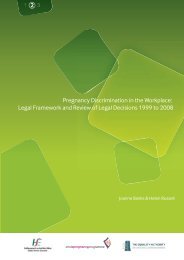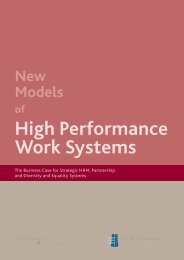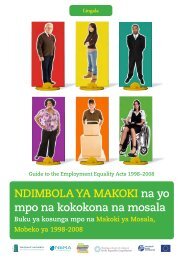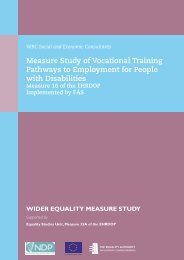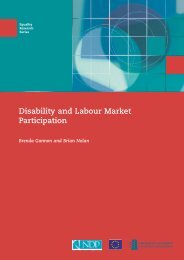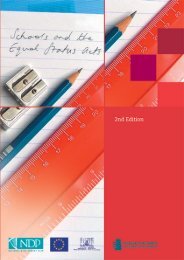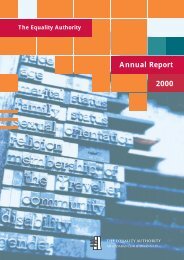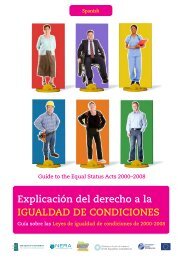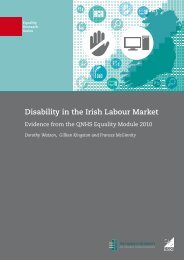page 12<strong>Mainstreaming</strong> <strong>Equality</strong>: Models for Statutory Duty – <strong>Conference</strong> <strong>Report</strong>page 13<strong>Mainstreaming</strong> <strong>Equality</strong>: Models for Statutory Duty – <strong>Conference</strong> <strong>Report</strong>kind of activity that they are going to focuson, we have managed to calm down theemployers and their union.Some private companies and parts of the publicsector have already started this work and theyrealise that this gives them positive results.Our present government has decided to developthe principle of gender budgeting and theministeries are are now in a process where theychoose political areas in which they will makegender sensitive accounts.In my opinion the year 2002 was an importantyear for development on gender equality inNorway.These new statutory duties to workactively and to make written accounts on genderequality will bring us important steps forward.In addition to these new statutory duties, theGovernment have also decided to put forwardto the Parliament a new legislation on quotas inboards of private and public companies.Our Minister for Trade and Industry stated on7th March last year that if the companies donot manage themselves by the end of 2005,there are going to be a stautory duty to have atleast 40% of each sex in every private andpublic board.<strong>Mainstreaming</strong> <strong>Equality</strong> –the Statutory Duties inNorthern IrelandBy Evelyn Collins, Chief Executive,<strong>Equality</strong> Commission for Northern IrelandThank you for the opportunity to participate atthis important event. I am very pleased to behere, both to learn about mainstreamingelsewhere and to share our experiences inNorthern Ireland with the implementation ofthe statutory duties arising from Section 75 ofthe Northern Ireland Act 1998.This Presentation Covers:• the basic mechanics of Section 75, whichplaces a statutory requirement on publicauthorities to carry out their duties with dueregard to the need to promote equalityacross nine grounds and regard to the needto promote good relations in respect of threegrounds.• guidance on the development of equalityschemes and equality impact assessments;• achievements and difficulties in respect ofimplementation to date;• further developments envisaged and areas forimprovement, as identified in the mid-termanalysis being undertaken by theCommission; and• an assessment of the importance of aStatutory Duty as a basis for helping todeliver equalityBy way of background, briefly, you will be awarethat through the 1990s there was a growinginterest internationally in mainstreaming equality,as a complementary approach to the moretraditional methods of tackling discrimination,such as anti-discrimination legislation. Manydefinitions have developed over the years,perhaps most simply put mainstreaming meansputting equality considerations at the heart ofdecision-making and service delivery.The following definition of mainstreaming istaken from the Commission’s publication, theGuide to the Statutory Duties, published in 2000.‘The (re)organisation, improvement, development andevaluation of policy processes, so that a(n) ….<strong>Equality</strong> perspective is incorporated in all policies atall levels and at all stages, by the actors normallyinvolved in policy-making.’Experience in Northern Ireland, with a voluntaryapproach to mainstreaming throughGovernment’s Policy Appraisal and FairTreatment Guidelines during the 1990s, waspoor.Their status was mainly advisory and,indeed, they tended to be ignored by somestatutory bodies.The response to this, through the work of thevarious equality bodies in existence then, theCommittee on the Administration of Justice andothers including the Standing AdvisoryCommission on Human Rights, was to call for anequality duty to be put on a statutory footing.The Government’s response to the StandingAdvisory Commission on Human Rights’ reviewof employment equality, issued in March 1998 asa White Paper Partnerships for <strong>Equality</strong> was toaccept SACHR’s recommendation on a statutoryequality duty.The White Paper also mootedmerging the various equality Commissions into asingle body, with a view to ensuring the effectiveimplementation of the duty.The whole issuethen got swept up in the political discussionsleading to the Belfast Agreement of April 1998, acentral theme of which, of course, relates toequality and human rights.The Agreement included a commitment fromGovernment to create a statutory duty onpublic authorities in Northern Ireland and thiswas given a legislative basis in the NorthernIreland Act 1998 – Section 75 and Schedule 9.The new <strong>Equality</strong> Commission, also created bythe Northern Ireland Act, was given a key roleto keep under review the effectiveness of theduties imposed by Section 75, to offer advice topublic authorities and others in connection withthose duties and to carry out specific functionsconferred on it by Schedule 9.1. Basic Mechanics of the DutiesTurning to the duty itself, Section 75 sets out thefollowing:
page 14<strong>Mainstreaming</strong> <strong>Equality</strong>: Models for Statutory Duty – <strong>Conference</strong> <strong>Report</strong>page 15<strong>Mainstreaming</strong> <strong>Equality</strong>: Models for Statutory Duty – <strong>Conference</strong> <strong>Report</strong>1. A public authority shall in carrying outits functions relating to Northern Irelandhave due regard to the need to promoteequality of opportunity –(a) between persons of different religiousbelief, political opinion, racial group, age,marital status, or sexual orientation;(b) between men and women generally’(c) between persons with a disability andpersons without;(d) between persons with dependants andpersons without.Without prejudice to these obligations, a publicauthority is also required, in carrying out itsfunctions, to have regard to the desirability ofpromoting good relations between persons ofdifferent religious belief, political opinion orracial group (Section 75 (2)).The decision to apply the new duties to areaswhere there is, as yet, no legislative prohibitionon discrimination, such as sexual orientation andage, is particularly important.This provided forthese areas to be given, for the first time, theequality profile that they deserve and well inadvance of the EU provisions beingimplemented.It is noteworthy that public authorities musthave regard to the good relations duty and dueregard to the equality duty.Whilst the equalityduty has been given primacy in the legislation,both the Commission and public authoritiesrecognise that good relations cannot be attainedif equality is not afforded and that this is animportant element of the Section 75 duties.In introducing Section 75, a priority need was toraise awareness and provide training on thestatutory duties.The Commission played a keyrole in awareness raising and training provision,with public authorities and with the voluntaryand community sector in particular, representingaffected groups.Public authorities also developed awarenessraising/training strategies and mechanisms tomainstream understanding of the duties, both forstaff employed by public authorities and forusers of services. Section 75 awareness has beenincorporated into staff induction programmes,specialist training in Screening and <strong>Equality</strong>Impact Assessment has been provided for keymanagerial staff.Public authorities must produce an <strong>Equality</strong>Scheme to comply with the legislation and thisScheme must be approved by the <strong>Equality</strong>Commission. Public authoritites must screen allof their policies, existing and new, and subjectthose policies with greatest likely impact onequality to a process of <strong>Equality</strong> ImpactAssessment.Consultation and public participation underpinsthe mainstreaming process and is a key elementof it.There must be consultation on draft<strong>Equality</strong> Schemes, on outcomes from screeningexercises and during <strong>Equality</strong> ImpactAssessments. Consultation must be bothmeaningful and inclusive. Consultation enables anassessment to be made of the views of thoseaffected by policy decisions or the design ofservices. It can help identify issues/problemswhich might otherwise not be discovered untillater – or too late – and it enables members ofaffected groups to participate in the process ofpolicy making.2. Guidance on equality schemes andimpact assessmentsSchedule 9 of the Northern Ireland Act sets outa detailed procedure for the enforcement of theduties. Public bodies are required to prepare an<strong>Equality</strong> Scheme stating how they propose tofulfil their equality duties.This must be submittedfor approval to the <strong>Equality</strong> Commission andconform to the guidelines as to form andcontent that we published in March 2000, withthe approval of the Secretary of State, followingextensive consultation.The <strong>Equality</strong> Scheme is a key document, beingboth a statement of the public authority’scommitment to fulfilling the statutory duties anda plan for their performance.So, what should an equality schemecontain? Schedule 9 is very specific about thecontent of <strong>Equality</strong> Schemes, they must showhow the public authority proposes to fulfil theduties imposed by Section 75 in relation torelevant functions.In particular, <strong>Equality</strong> Schemes must include:1. a general introductory statement specifyingthe purpose of the Scheme and the publicauthority’s commitment to the statutoryduties;2. arrangements for assessing its compliancewith the Section 75 duties and for consultingon matters to which a duty under thatSection is likely to be relevant;3. arrangements for assessing and consulting onthe impact of policies adopted or proposedto be adopted on the promotion of equalityof opportunity;4. arrangements for monitoring any adverseimpact of policies adopted by the authorityon the promotion of equality of opportunity;5. arrangements for publishing the results ofequality impact assessments and ofmonitoring of any adverse impact of policiesadopted by the authority on the promotionof equality of opportunity.This must include a commitment to includingin the published results of an equality impactassessment:• a statement of the aims of the policy towhich the assessment relates;• details of any consideration given by theauthority to measures which mightmitigate any adverse impact of that policyon the promotion of equality ofopportunity;• details of any consideration given by theauthority to alternative policies whichmight better achieve the promotion ofequality of opportunity.6. a commitment that in making any decisionwith respect to a policy adopted orproposed to be adopted by it, that the publicauthority shall take into account any equalityimpact assessment and consultation carriedout in relation to the policy;7. arrangements for training staff on issuesrelevant to the duties;8. arrangements for ensuring, and assessing,public access to information and to servicesprovided by the authority;9. the timetable for measures proposed in theScheme;10. details of how the Scheme will be published;11. arrangements for dealing with complaintsarising from a failure to comply with theScheme;12. a commitment to conducting a review of theScheme within five years of its submission tothe <strong>Equality</strong> Commission and to forwardinga report of this review to the <strong>Equality</strong>Commission (Schedule 9).The duties applied to GovernmentDepartments, local government, health,education and other public bodies from January2000 and they had until30 June that year to submit draft Schemes to the<strong>Equality</strong> Commission for approval.Following a process of auditing the draftScheme, and analysing an audit of theconsultations on the draft scheme, Commissionstaff discussed detailed comments with eachpublic authority.The public authorities amendedtheir Schemes and returned them to theCommission for approval, which commencedthen in a rolling plan from early 2001. Ongoingadvice, guidance, training and support to publicauthorities is provided by the Commission.Screening of all existing policies, written andunwritten, is required as part of the process.Screening is based upon criteria in theCommission’s Guide to the Statutory Duties,which helps public authorities to identify theestimated impact of policies on equality ofopportunity.The criteria involves considerationof whether there is evidence of higher or lowerparticipation or uptake by different groups;whether there is evidence that different groupshave different needs, experiences, issues andpriorities in relation to the particular policy;whether there is an opportunity to betterpromote equality of opportunity or bettercommunity relations by altering the policy orworking with others in Government or in thelarger community; and whether consultationswith relevant groups, organisations or individualsindicated that particular policies create problemswhich are specific to them.


